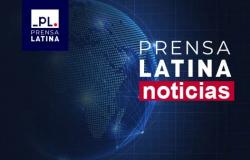
By revoking your invitation as international observer to the European Union (EU)the regime Nicolas Maduro not only added an item to the to-do list (or half-done things) of the Barbados Agreementbut also deployed on the presidential elections on July 28 the ghost of doubt, putting into practice his well-known manual to disperse the opposition vote.
The EU is recognized throughout the world for carrying out electoral observation missionsas part of a work that in some way certifies that the consultation process has complied to a greater or lesser extent with standards that guarantee the prevalence of democracy.
Although it does not become a determining factor on the result, the absence of the European mission in the July elections has significant repercussions for the electoral process and the international perception of its legitimacy.
In dialogue with Infobae, Eugenio Martínezjournalist specialized in electoral sources and director of Votoscope.comexplained that “the definitive absence already confirmed of the European Union as an observer of the 2024 elections is a sensitive loss for everything that has to do with election monitoring.”
According to Martinezknown on social networks as @puzkas, without the participation of the EU The weight of the observation will fall mainly on the Carter Center and, to a lesser extent, in the Panel of Experts of United Nations.
But, until now, the Carter Center has not confirmed its participation, and if it attends, its deployment would be much more limited compared to a mission of the EU. The organization, founded by the former president of the United States, Jimmy Carterand who participated in a meeting with the authorities of the Electoral Power from Venezuela in mid-April, has remained silent in the midst of the conflict that the electoral body unleashed by vetoing the european alliance.
As for the UN Panel of Experts, it is a small group, made up of five or six people, whose mission is more academic in nature, its results are private and intended exclusively for the UN Secretary General.
Jose Domingo Mujicanational coordinator of the Venezuelan Electoral Observation Networkalso expressed concern about the revocation of the EU invitation.
“The roles of the so-called accompaniment missions are diverse. Some few have the capacity to carry out an actual electoral observation with a team of trained observers who distribute to different sites in the country,” said Mujica. In this sense, the absence of the EU translates into the lack of one of the few organizations with the capacity to carry out complete observation of the election.
For the July 28 elections, National Electoral Council of Venezuela (CNE)affectionate to the Chavista regime, ratified the call for a “broad oversight” of the Community of States and Caribbeans (CELAC), Caribbean Community (Caricom), the Inter-American Union of Electoral Organizations (Uniorec), the United Nations Panel of Expertsthe African Unionhe Carter Centerhe Council of Electoral Experts of Latin Americaamong others.
The EU He was a traditional observer of the electoral processes in Venezuela until 2006, when the CNE stopped allowing formal international observation. After an absence of almost 15 years, the European Union It returned in 2021 thanks to a special agreement between the Venezuelan regime and the Alliance of the old continent, which allowed a complete observation mission. However, this special agreement needed to be renewed for the 2024 election.something that will no longer happen due to the revocation of the invitation.
At that time, bloc observers reported improvements in the voting system, but also irregularities such as the use of public resources in the campaign, the establishment of control points by the regime’s party in voting centers and the “arbitrary” disqualification of candidates.
Before the crisis in Venezuela worsened, the Organization of American States (OAS), who also has a recognized track record in electoral oversight processes, participated in observation missions in elections in the Caribbean country, as he does regularly in each process held in the region. But, after the withdrawal of the Venezuelan State from the bloc, which became official in 2019, there is no possibility that OAS technical teams can be deployed to do his job next July 28 in Venezuela.
For this reason, Mujica highlighted the importance of the opposition insisting on the demand that the participation of the technicians of the European Union in the presidential elections. But, despite the claims inside and outside Venezuela, this change in the electoral board could not stop its march, and increase pressure on the civil society to support the tasks of supervision of the voting process and defense of the vote.
To understand this phenomenon, Martínez explained that the international electoral observation missions They do not act as an “electoral police” who can prevent the commission of crimes, but rather their main role is document the process and, after the election, evaluate the credibility of the results offered.
Faced with the withdrawal of the invitation by the CNE to the EU, The Venezuelan opposition faces the challenge of maintaining its strategy of defending the vote without the support of the EU observation mission.
According to the director of Votoscopethe strategy must be as rigorous as if the EU were present, given that international observation, although it cannot prevent illegal acts, can document and minimize the intention to commit them.
“The strategy of defending the vote of the Venezuelan opposition should not change despite the absence of the EU mission”since its rigor must be maintained regardless of international presence.
Mujica noted that electoral observation missions have provided valuable evaluations of electoral processes in Venezuela, providing relevant recommendations to electoral authorities to improve elections. In addition, their presence has contributed to raising voter confidence, which generally translates into greater participation.
“The contribution of the electoral observers of the European Unionwhich enjoy wide recognition in the world, could offer an impartial evaluation of high technical quality of the electoral process, it would probably have great acceptance by the international community,” he explained
In the past, the EUhe Carter Center and the Organization of American States (OAS) have been real electoral observers in Venezuela. They deployed teams of observers in sufficient numbers to have a presence in different parts of the country and offered detailed reports of what happened. However, in recent years, the CNE has chosen to invite a group of organizations that provide more political support than rigorous technical observation of the elections.





